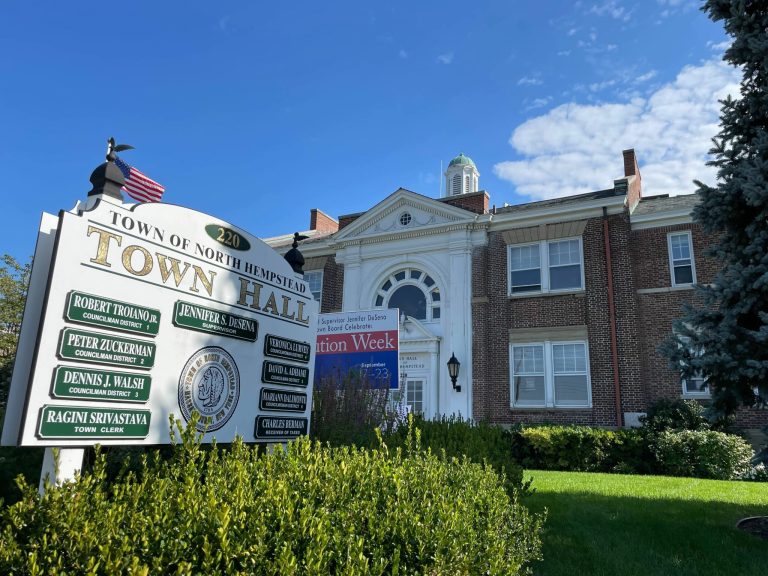
North Hempstead Supervisor Jennifer DeSena announced a reform plan for the town’s Building Department Wednesday, seven months after the county delivered its audit report and after years of issues plaguing the department.
The announcement, made alongside North Hempstead Council Members Ed Scott and Dennis Walsh, focused on an initiative to “address longstanding problems” within the department.
The first set of departmental reforms will be part of a series to be implemented over time. DeSena announced eight reforms to the department on Wednesday.
These include overhauling the intake communication model and breaking down the wall between the department and the public; evaluating citizen serve, which is the software being used in the department; digitizing all the records; establishing a fair and efficient appeals process; restructuring assignment rotations for inspectors; assembling the supervisor’s advisory panel that will include those with first-hand experience in knowledge of a particular field such as architects, builders, contractors, retired building inspectors and judges; addressing expedited review; and establishing the Legacy Issue Resolution Committee.
“I think the most important thing is breaking down the wall between the residents and that department,” DeSena said. “People deserve an accessible and accountable Building Department.”
In 2007, five Building Department officials were indicted after a 16-month investigation by then-Nassau County District Attorney Kathleen Rice for receiving favors and payments in exchange for granting permits without inspections.
All five were later convicted, including former Commissioner David Wasserman. He was sentenced to one year in jail in 2008 after pleading guilty to grand larceny and falsifying business records.
Scott said the Legacy Issue Resolution Committee was created because of the “corruption” that transpired between 2003 and 2007. He said many constituents in his district have fallen victim to the Building Department taking bribes and houses being built over the allowable square footage. These property owners were issued improper and nonconforming certificates of occupancy, and as a result they are not currently in compliance with state law.
The committee, which will be an outside panel of advisers, will review and advise on structuring a resolution to bring these properties into compliance and remedy their situation.
“It’s been a long time that they have not been able to get relief,” DeSena said. “So they’ll be making recommendations to what we can do so that these homeowners can move forward.”
The department has also been criticized for its approval delays, which have dragged out processes for businesses and residents over the years.
A Nassau County comptroller audit of the Town of North Hempstead’s Building Department revealed numerous inefficiencies in the department’s procedures as well.
“We found significant operational deficiencies and have provided detailed recommendations that can help the Building Department improve efficiency and increase transparency,” Nassau County Comptroller Elaine Phillips said. “In addition, the audit revealed that an attitude shift toward prioritizing constituent service would benefit the town, its residents and business professionals.”
DeSena requested the audit in July 2022 after winning election in November 2021 after a campaign in which she focused on the need for department changes.
Findings in the audit included “significant problems” with the department’s online permit portal that underutilized software features, a lack of standardized procedures and operational oversight leading to operational inefficiencies, a lack of communication and transparency with permit applicants, and a lack of standardization for permit expedition procedures.
The audit also stated that the town’s “bifurcation” during the 18-month audit had a negative impact on the implementation of the Building Department portal.
The county said that the software available for the Building Department can modernize permitting processes for department employees and permit applicants.
They said the department is not utilizing this software “to improve process flow, facilitate communication, and enable constituents to easily track their permit applications online.”
If utilized more, the county said this software would “improve constituent and employee satisfaction, increase efficiency and transparency, and help the Building Department to standardize processes and implement quality control.”
During the audit process, the county comptroller’s office spoke with residents, members of the town’s administration, commissioners and staff, architects, engineers and contractors. They also conducted two customer satisfaction surveys.
At a Great Neck Chamber of Commerce breakfast in June, DeSena said changes to the Building Department in response to the audit would be announced by the end of summer.
“If you read this report, it’s clear that over 15 years of problems aren’t going away overnight,” DeSena said in a statement to Blank Slate Media. “You don’t implement 83 pages of recommendations carelessly. It has to be done deliberately and with great attention to permanent fixes. No one said it was going to be easy, but we’re on the right side of it and we know exactly what our residents deserve.”
DeSena has previously said that delays in addressing the Building Department are attributed to partisanship on the town board. This included criticisms from the board’s Democrats about DeSena withholding the department’s reviews from the board and blocking the supervisor’s department reforms.
DeSena is a registered Democrat, but as supervisor she belongs to the Republican Party.
Some changes were made before the audit in 2022. This included changing the department’s expedited permit review process that added criteria permitting someone to receive a decision within five days and removing the Town Board’s ability to override the department’s decisions.
In a town press release, the expedited review process is referred to as “egregious” and a method for individuals to “leapfrog” the typical process. The process was criticized for politicization and calls for a rethinking of the process.
Also implemented that year were monthly reports from the town’s Building Department. Prior reports were only given annually.
This story has been updated to provide further information on the expedited review process.






